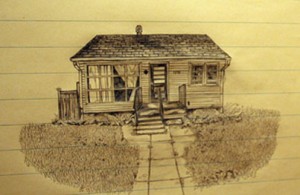Thinking through how we define, or relate to home was such an interesting idea and each person in this class parsed through such convincing, beautiful, and entirely different ways of challenging home.
I’ve sorted my thoughts into four separate ideas. Shifted/Lived/History/Future
Shiftedness- I love the idea that home for many of us is always changing, both in terms of the physicality of it, but also in terms of the emotive context. I think to the movie “Garden State” wherein Zach Braff’s character recalls a moment of ‘going home’ wherein his parents’ house no longer feels like home (conversation starts at 1:05). He operates here, at a loss—home becomes defined as what was and what could be. Natalie Portman’s character accounts that her parents’ home is still her home. Keeping this video in dialogue with our own thinkings of home lets me see the myriad of ways in which we encounter ourselves in relation to home. It is not static, and even if it is (in Portman’s case) there is a sense of change on the horizon, a ‘not yet, but soon’ if you will.
Lived- A complicated sort of idea that kept coming up for me while reading everyone’s blogs on home (and how well-written they were!) was this idea of the contemporary–the current. Some students called upon a feeling of ambivalence or complicatedness of things becoming home but not quite there yet. In this way, home becomes a sort of acted upon imagination. It is constructed, and worked on, and always negotiated upon. Home doesn’t happen upon us, it is fashioned by us. Thinking of these tensions of negotiations in relation to indigenous sovereignty makes these feelings even more complex. Negotiating a lived home on stolen or occupied land(s) makes home a complex notion, a violent notion. An ability to call space home is presupposed on years of systemic and state-sanctioned oppression and genocide.
History- People, including myself, speak to a past that must be summoned or acted upon in order to create home. It is hard to see where we’re going without first seeing where we were. Childhood homes, first homes with roommates or partners, dormrooms, these are all built and negotiated upon a before. I wonder what the imaginative possibilities of a history-less home looks like? A home that exists devoid or separate from a relation to your past. Thinking/feeling through this idea leads me to a question of homes. Is it possible to hold several homes at once? Neither being more important than the other, and all circulating around a point of being in the world?
Future- This idea of homes makes me think of how many people in the class were looking forward to changes, or speculative relationalities that would reinforce/repatriate/rebuild homes for them. Whether it’s the idea of a partner, or a child coming into their lives, there is a sense of change and want in our understandings of home. Future then, allows us to take up a home in a form that is not physical. Emotive, or affective homemaking becomes a future-home, one which isn’t built from woodframes and steel bars, but from a hope, want, desire, or expectation for change.
Works Cited
Belliveau, Elisabeth. “Home.” Cartoon. Don’t Get Lonely Don’t Get Lost. Wolfville: Conundrum, 2010. Print.
Churchill, Ward. Struggle for the land: Native North American resistance to genocide, ecocide, and colonization. City Lights Books, 2002.
Garden State. By Zach Braff. Dir. Zach Braff. Perf. Zach Braff and Natalie Portman. Fox Searchlight, 2004.

One reply on “Thoughts On Home”
🙂 thank you Daniel